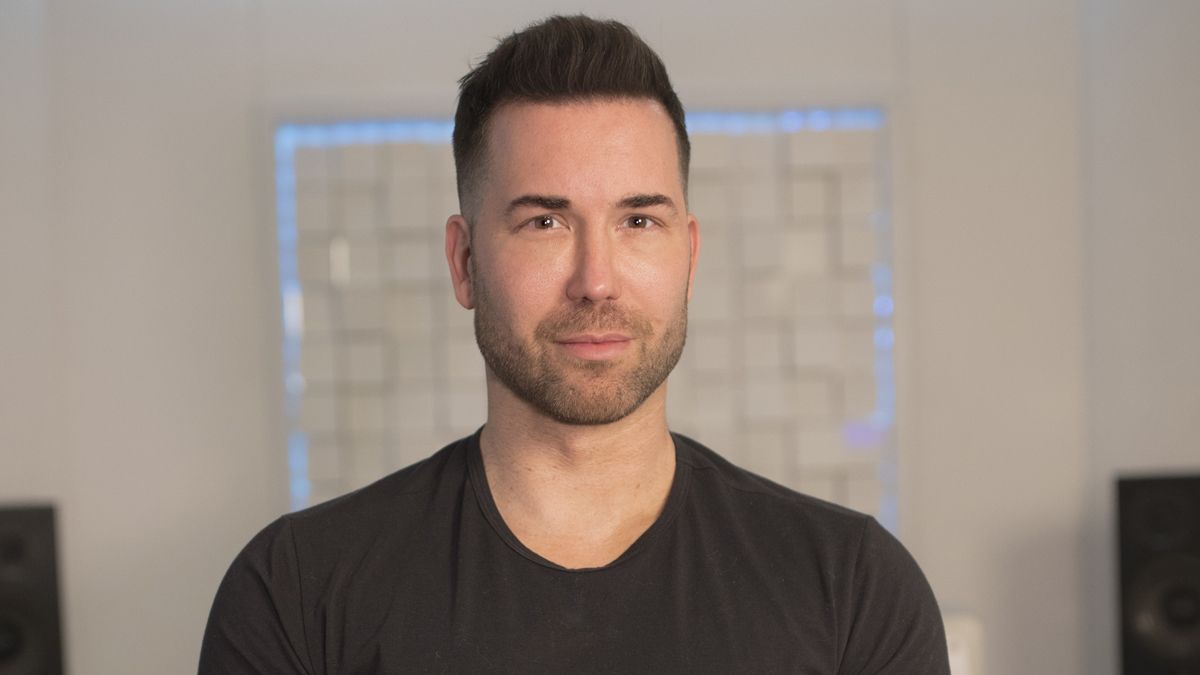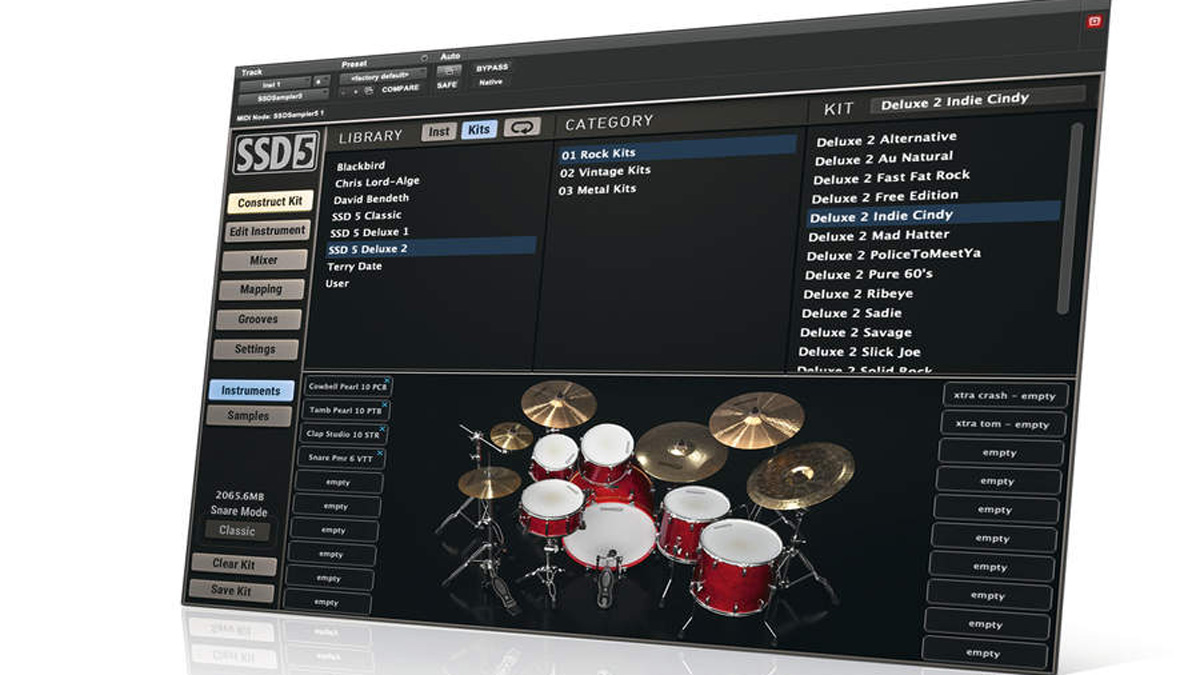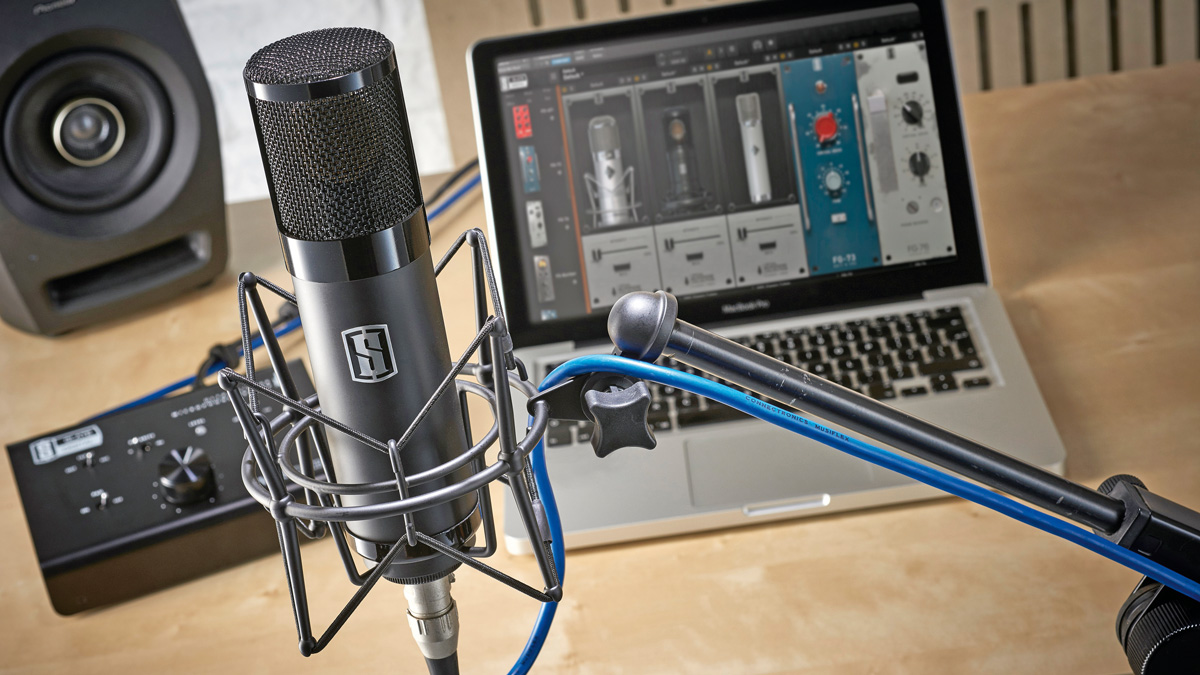Plugin mogul Steven Slate: "You don’t need external DSP for tracking, you don’t need it for mixing, and it just doesn’t make sense to me"
Best of 2019: The Slate Digital boss on emulation, motivation and why the future of making music isn’t about audio engineering

Want all the hottest music and gear news, reviews, deals, features and more, direct to your inbox? Sign up here.
You are now subscribed
Your newsletter sign-up was successful
Best of 2019: Music technology has had its fair share of “So good I put my name on it” moments, with product designers including Leo Fender, Rupert Neve, Dave Smith, Roger Linn and Urs Heckmann staking their reputations on their gear by branding it with their monikers. Another man who’s gone down this road is one Steven Slate.
While Steven co-founded Slate Digital with Fabrice Gabriel, taking expensive, timepiece studio hardware and emulating it in cheaper, more accessible software, only one of them would be the face - and the name - of the company.
Slate Digital was one of the first music software companies to bring a subscription bundle to market, offering every single one of its analogue-modelling plugins - and, increasingly, plugins from other developers - as part of its Everything Bundle, for $14.99 a month.
With Slate Media Technology, Steven has also spent years changing the way studios work with audio. He launched the Raven consoles, a line of studio touchscreens and workstations intended solely for production and mixing.
When we connect with Steven at nine o’clock in the morning, that’s what’s currently on his mind…
“We have a big release today actually, we’re releasing the MTZ, the newest large-format Raven console, right after I’m done talking to you.”
So we’re the only thing standing between the MTZ and the world right now…
Want all the hottest music and gear news, reviews, deals, features and more, direct to your inbox? Sign up here.
“No pressure.”
How has the Raven line changed over the years? In 2019, touchscreens are a completely accepted way to get things done.
“So when we first came out with the Raven in 2012 it was a $16,500 device, a 46-inch infrared screen, and a commercial display. It was a very expensive device, but here were are now, seven years later, and now it’s a 1.5-inch thin projective capacitive touchscreen panel. It’s 43 inches, and it costs $3,000.”
The Slate story
You might be into touch displays and plugin emulations right now, but you started in a completely different space with Steven Slate Drums. Was that your first involvement in the MI industry?
“If you want to go way back, I started playing guitar because I thought it would help me get chicks. But beyond that, in Boston in the late ‘90s, early ‘00s, I started making records; recording, interning in studios, assisting in studios.
“When I started my own little studio back in Boston, I realised this was my path. Performing wasn’t as much of a passion as being behind the scenes. And so my plan was to go to Los Angeles and become a protegé to a famous producer or mixer.
“At the time, I had a really crappy drum recording room in Boston in this warehouse, so I started making drum samples in an attempt to try to improve the sound of my drums. It was out of necessity… and also because I wanted a drum sound like Nirvana’s Nevermind. When I was producing a song, I would just replace all the drums with Nevermind-style sampled drums, which would drive people nuts - I thought I was doing them a favour, but I really wasn’t.
When I was producing a song, I would just replace all the drums with Nevermind-style sampled drums, which would drive people nuts - I thought I was doing them a favour, but I really wasn’t.
Steven Slate
“So anyway, I had this drum sample CD and I used it as a business card. I would sneak into these music industry parties, and I would hand out this drum sample CD to a bunch of famous producers and mixers in the hopes that they would hire me as their protegé - that they would see this as a motivated and hardworking thing for someone to do. Instead of just saying, ‘Hey, hire me,’ it’s, ‘I’m giving you something to show my value’… and the plan backfired.
“No one wanted to hire me as their protegé, but people did call me to get more drum samples. For instance, I remember Mike Shipley calling me about a Santana record he was doing, and he needed a certain style kick and snare, which I then made for him. Then someone called me about a Kelly Clarkson record that was happening, and then a Nickelback record… and I said, ‘OK, I guess now I make audio products.’

And it’s not like you’ve put that side down - Steven Slate Drums 5 came out about six months ago.
“Yeah, this month was called Drum Month here at Slate, and we sold more of our Trigger and SSD programs in this one month than we had in the previous year alone - it was a huge month for us. It’s still one of our big flagship products.”
What is it that motivates you to create the things you create now?
“Watching the evolution of the industry. There are new things, new people, new data, new music styles, and it keeps changing and creating new opportunities. You’re about to see something in about one month which is the result of that strategy. We’re releasing a whole new vision that’s based on the shifts of the industry.”
You’re best-known for plugin emulations of studio hardware. Why emulate instead of making something new - especially with that attitude of looking where the industry’s going?
“You’re right that, primarily, we emulate famous gear, but there are some exceptions. The Custom Series EQ was my design where I took curves I liked from certain EQs and made an all-star equalizer. There are processors like FG-Bomber, which is a whacky creation of mine that does expansion, dynamics, harmonics and transient enhancement all in one processor.
Virtual instruments? That’s definitely an area we’re interested in.
“I come from the world of analogue gear, and there are certain pieces of famous gear that have a certain sonic signature that I like and a lot of people like, so I think that’s why, primarily, we’ve done that in our virtual analogue line. But what you’re about to see is us breaking out of that as well - not stop it, but expand upon it.”
What about virtual instruments? Have you ever felt like taking the plunge into something like that, or is it more of a principle for you to stick with hardware effects recreations? Tell us if we hit a nerve regarding next month’s secret product release…
“Virtual instruments? That’s definitely an area we’re interested in.”
Subscribe to survive
We can talk about hardware and software all day, but when it comes to the real world, people actually have to pay to get it. It seems like every company that offers a subscription has its own model - some are liked, some aren’t. What was your philosophy when you came up with the Everything Bundle?
“At the time, I was switching over from buying shows and DVDs at Best Buy. I’d been spending hundreds of dollars on a few shows, and then all of a sudden, I got the Netflix trial, and the whole entire three seasons of Sons of Anarchy was right there in front of my face, at $8 a month. I was elated by that feeling of being able to watch these series, and then another amazing show got added. I thought, ‘this is a business model that works’. This makes sense. I’m spending less, I’m getting the same content, and I’m happy.
“I looked out there to the audio world, and what did I see? Tons of people trying to crack software - and the piracy problem in this industry is far worse than most people even know. I went to see professionals, and they even had cracks. I thought it was time to eliminate the barrier to entry. This was before Waves was charging $29 per plugin; this was when you couldn’t get high-quality plugins for less than a hundred, two hundred dollars.
“I said, ‘let’s take a chance and try this’, and eliminate the financial barrier to entry, and it took about a year for people to get it. Once we started adding more content, it just clicked. It’s probably the best decision of my entire career.”
Do you still offer single full licenses to plugins when people want to just buy them outright?
“We do - you can still go to every product page and buy it, but it’s not a high seller. For the cost of one single plugin, you can get a year of all the plugins. If you have some kind of desire to own a piece of code on your computer, and you have that kind of money, go for it. You have that option.”
How do you see the future of paying for music software?
“I think that more companies are going to end up going on subscription, and the ones that don’t will have lots of trouble - they’ll have to sell their software very cheap, even cheaper than $29. They’re going to have to really bring down the barrier to entry.”
I think that more companies are going to end up going on subscription, and the ones that don’t will have lots of trouble.
Steven Slate
That might lower the barrier to entry for new customers, but doesn’t that raise the barrier to entry to new companies? If you’re only selling one or two products - and that might take, say, a year - you can’t launch a subscription.
“You’re 100% right - subscription only works when you have a collection. It doesn’t work on single titles, or even on a few titles. I think the smaller companies are going to come out, do five- or ten-dollar plugins, and possibly they can compete, although it’s going to be much more challenging. We were lucky that we got in before it was so competitive.”
But if you’re running a subscription model, you’re not just competing with the other plugin companies and DAW developers - you’re also competing with Netflix, Amazon Prime, people’s electric companies and landlords. For every person, there’s only a finite number of subscriptions you can have.
“And that’s why we have to fill the whole audio portion of your subscription needs. We can’t just do analogue-modelled plugins. We can’t just stick to one thing; it has to be something where we supply everything you need for the audio side.
“Netflix is trying to supply everything you need for the entertainment side. Netflix’s goal is - and I’ve spoken to guys at Netflix - that they don’t want you subscribing to Amazon or Hulu, they want to give you enough content where you don’t think you’ll need that. And, of course, Amazon will say the same thing, and Hulu will say the same thing.”
So the Everything Bundle needs to give people everything - you don’t want them running off to Plugin Alliance or Roland Cloud…
“If they’re doing that, then we’re not doing enough here. It should be about us being able to do enough to meet everyone’s audio needs. We’re not there yet, but we’re getting close. We have a lot of third parties in the bundle now; we just added TH-U, a huge guitar suite from Overloud, and so when you rent the Slate bundle, it’s not just the Slate bundle, it’s a lot of different products from a lot of different companies.”

To DSP or not to DSP
The average good computer nowadays might have a six-core CPU. It’ll run everything very easily, and software can use multithreading. Is external DSP processing still necessary these days?
“Absolutely not. Not even for tracking. On the Mac that I’m speaking to you on, I just loaded a 120-track session from a friend of mine, with all these vocals and all this crap. I put a bunch of plugins on it, reverb all over the place. I couldn’t even break 50% CPU if I tried.
“A lot of people say, ‘Well, when tracking, that’s when you need the DSP, so you can track through plugins.’ We make a product called the VRS-8, and it can track through plugins at 1.3ms latency. You don’t need DSP for tracking, you don’t need it for mixing, and it just doesn’t make sense to me.”
You don’t need DSP for tracking, you don’t need it for mixing, and it just doesn’t make sense to me.
Steven Slate
Slate expectations
When you look at the industry as a whole, where do you think we’re heading? What’s going to change?
“We’re going to see a lot more music creators and producers, and fewer engineers. It’s going to be more about music production, and less about engineering.”
You think people will start to escape the rabbit hole of the technical side of production...
“I think that’s already the way it’s going, and it’ll go further towards that. You’re always going to have people who want to enjoy the process, but most people now are results-oriented. They want to get to the end product, and people who allow you to get to the end product in more creative, clever and intuitive ways are going to win; people who focus on process-process-process are going to lose.
“Some people once hired me as a consultant to help with their products. They were making a converter, and they wanted my ears on it; my opinion. They called me in to take a listen to their converter vs two other converters. They brought me in, and the source material they played was this singer, who was quite possibly one of the worst singers I’ve heard. Absolutely awful. Completely tone deaf, it was ridiculous.
“They had me listen to all three of these converters, and they said, ‘Well, what do you think?’ And I go, ‘It doesn’t matter, they all sound like shit. Because the source is shit.’ Any one of those converters would have been fine, and my point to them was that they wouldn’t really win based on the spec - it’s about getting people to listen to the results.”
So how do you respond to that particular trend in the way you design your products?
“We have to make tools that focus less on the process and more on the result. What do people want the track to sound like? What are people trying to achieve? It’s thinking about how we can make tools that get you there and don’t make you have to engineer.
“Does this mean we’re ditching process-focused plugins? No. There’s always going to be that person who loves the process and wants to be techie and tweaky, but in order to really grow and expand in this industry as a developer, you have to make products that are focused on results. iZotope does a great job of that, by the way.”
Are there any other developers out there you especially appreciate?
“So many. Waves, Softube, UAD, Boz Digital… everyone’s good. It’s hard to say which ones are bad - there are really no bad competitors. They’re all really great and talented companies. It’s now about how to connect to the consumer to show why they should go our route and not their route, and it’s hard. It’s not easy but we’re going to keep doing it.”

A former Production Editor of Computer Music and FutureMusic magazines, James has gone on to be a freelance writer and reviewer of music software since 2018, and has also written for many of the biggest brands in music software. His specialties include mixing techniques, DAWs, acoustics and audio analysis, as well as an overall knowledge of the music software industry.